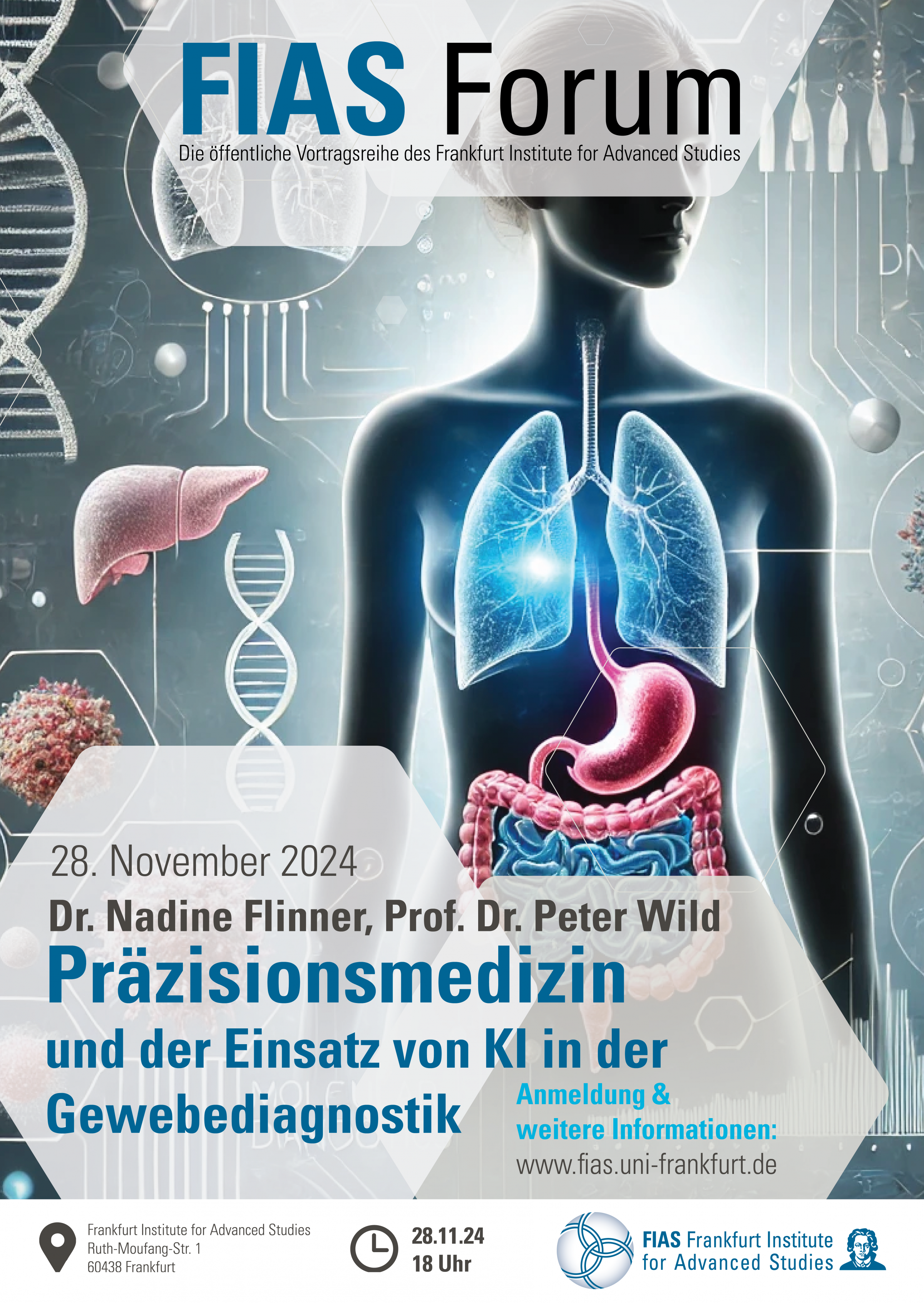November 28, 2024 6:00 PM / Everyone
Precision medicine and the use of AI in tissue diagnostics
FIAS Forum on 28 November 2024

Venue: FIAS Hörsaal
FIAS Fellows Dr Nadine Flinner and Prof. Dr Peter Wild talk about AI methods in molecular diagnostics and the active collaboration at FIAS, Goethe University and in the Rhine-Main research environment.
The Lecture:
The rapid development of molecular diagnostics and artificial intelligence (AI) is revolutionizing tissue diagnostics and enabling personalized therapy in oncology. Modern AI methods not only offer precise analysis of complex data but also help reduce inter-observer variability by increasing the consistency and objectivity of diagnostic decisions. The lecture will demonstrate how AI-supported technologies, combined with molecular analyses, contribute to improving cancer treatment. Specific applications and study results will be presented to highlight the added value of these innovations for diagnostics and therapy planning. The focus is on the sustainable integration of these methods into clinical practice and the resulting benefits for patients and medical professionals.
Further Information & Registration:
Event Details:
- Date: 28.11.2024
- Start of Lecture: 18:00
- Reception: A small reception will follow the lecture (advance registration required)
- Location: FIAS Auditorium
Registration:
Participation in the event is free of charge. However, due to limited capacity for the reception, we kindly ask for prior registration.
The Speakers:
Nadine Flinner (*1986) studied bioinformatics and worked in the field of structure and phylogeny of membrane proteins during her diploma thesis. In her Ph.D., completed in 2015, she examined the behavior of membrane proteins using molecular dynamics simulations. Nadine began as a PostDoc at FIAS, studying the migration of immune cells, and is now focused on understanding the correlation between cell morphology and underlying molecular features. She has been a FIAS Fellow since 2020. Currently, she is working at Senckenberg Institute of Pathology (SIP) at the University Hospital Frankfurt.
After completing his medical studies at the University of Regensburg in 2001, Peter Wild began his specialist training in pathology (University Hospital Regensburg, Hamburg-Eppendorf, and Zurich). From 2001 to 2005, he completed postgraduate training in medical biometrics at the University of Heidelberg. In May 2008, Wild received the German specialist diploma in pathology from the Hamburg Medical Association, and in May 2010, the Swiss specialist diploma in pathology (FMH). After a two-year postdoctoral fellowship with Prof. Wilhelm Krek at the Institute of Cell Biology at ETH Zurich, he worked from 2010 to 2012 as a senior physician at the Institute of Surgical Pathology and Molecular Pathology, University Hospital Zurich. In September 2012, Peter Wild was appointed assistant professor (tenure track) for systems pathology and became an attending physician at the Institute for Surgical Pathology and Molecular Pathology, University Hospital Zurich. As the principal investigator and director of the Laboratory for High-Throughput Genomics and Proteomics at the University Hospital Zurich, he was responsible for integrating next-generation sequencing and mass spectrometry techniques into clinical practice. In 2016, Professor Wild was appointed Chair of Systems Pathology at the University of Zurich. Professor Wild turned down an offer from Charité – Universitätsmedizin Berlin to accept an offer from Goethe University Frankfurt in December 2017. Since April 2018, he has been Director of the Dr. Senckenberg Institute of Pathology (SIP) at the University Hospital Frankfurt. Under his leadership, SIP is establishing itself as one of the first digital pathology institutes. Since 2019, Professor Wild has been working as an employed specialist in pathology at WILDLAB, with a focus on uropathology and molecular pathology. Since September 2020, Professor Wild has been a Senior Fellow at FIAS.